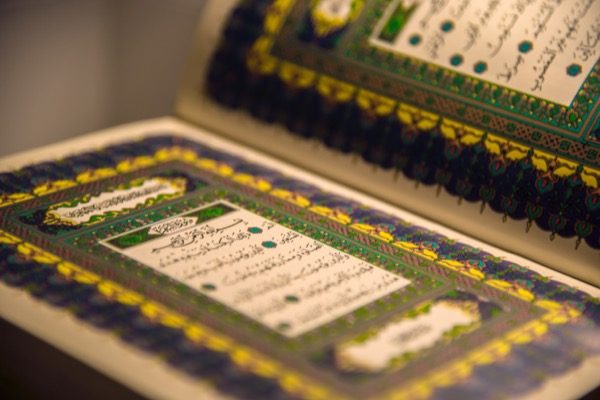Chapter 1, Verse 1

بِسْمِ اللَّهِ الرَّحْمَنِ الرَّحِيمِ
By invoking the name of Allah, the Most Gracious, the Ever Merciful, I recite. (2)
(2) Key Word Analysis
باء (bā’)
The particle bā’ which appears at the beginning of bismillāh is not merely a letter of the Arabic alphabet; rather, it is a letter that conveys a complete meaning. In the Arabic language, some letters, apart from representing a character of the alphabet, also carry certain meanings. The letter bā’, the second letter of the Arabic alphabet, is one of the characters that conveys a complete meaning [by itself]. It signifies association and seeking help. Its literal translation is ‘by’ and ‘with’. However, since neither definition fully conveys the proper meaning of bā’ on its own, it has been translated as ‘by invoking,’ which is the closest phrase that can encompass both of the above meanings. Therefore, the translation of this verse would be, ‘Having associated myself with God Almighty and seeking His help, I proceed to recite the following words’.
Bā’ is a preposition [ḥarf jarr]. That is, when nouns are preceded by these prepositions, the last letter [of the noun] contains a kasrah or the sign of a kasrah[1]. According to the rules of the Arabic language, many times before these prepositions there is a hidden or implied word or phrase that is understood to be there in the context of the sentence. Some have suggested that, before this verse of bismillāh, اِقْرَأْ (iqra’) or اِشْرَعْ (ishra‘) is implied, meaning, ‘recite!’ or ‘begin!’. They have justified this by citing the verse of Sūrah al-‘Alaq:
[2]اِقْرَأْ بِاسْمِ رَبِّكَ الَّذِي خَلَقَ,
‘Convey thou in the name of thy Lord Who created’, arguing that the aforementioned word or something similar to it would be understood here.
Zamakhsharī[3] has suggested that the use of the present tense before the letter bā’ ought to be aqra’u ‘I recite’ or ashra‘u ‘I begin’ instead of their aforementioned imperative forms. Zamaksharī further states that these words ought to be placed after bismillāh, which should be translated as, ‘by invoking the name of Allah, I recite’ as opposed to ‘I recite, by invoking the name of Allah.’ The reason is that emphasis ought to be laid on the name of Allah. However, if ‘I recite’ is placed at the beginning, the emphasis falls on the words ‘I recite’ instead. Zamaksharī’s interpretation is very profound, hence I have also adopted this in my understanding of this verse. In response to why iqra’ appears at the beginning of Sūrah al-‘Alaq, Zamakhsharī holds the view that here, the word ‘recite’ was emphasised because the Holy Prophetsa hesitated to recite[4]. Nonetheless, in bismillāh, the aim was not to emphasise the act of recitation; rather, it was intended that whilst reading the emphasis be laid on invoking the name of Allah Almighty. Therefore, it is more apt to assume that the word ‘recite’ is implied afterwards. This explanation of Zamaksharī too is most profound, and these meanings support the evidence I presented above with regards to why bismillāh is placed before every sūrah in the Qur’an.
(اسم ism)
بسم bism is a compound word, which has been formed by joining the letter bā’ with the noun ism. The letter ء [hamzah][5] in the word ism has been dropped, resulting in bism. In the Arabic language, some hamzahs are silent. These are referred to as hamzatul-waṣl [the joining hamzah]. However, here in bismillāh, the letter hamzah is not even written. According to the grammarians, the only reason for not including the hamzah is due to its frequent use. Nisā’ī and Akhfash[6] believe that wherever the word ism occurs with the attributes of Allah the Almighty, hamzah ought to be omitted. However, Farrā’ believes that hamzah should be omitted only when writing bismillah, as its omission is established by textual precedent. However, in the case of other divine attributes, hamzah should not be omitted as there is no precedent for this.[7]
Ism means an attribute or a name.[8] This word is not derived from the Arabic letters ا-س-م, rather it is derived from the root و-س-م or س-م-و. The و has been changed into ا. Those who think that it is derived from و-س-م, take it to mean a mark or a sign. However, those who believe that it is derived from the root س-م-و, take it to mean ‘being lofty’.[9]
(الله Allah)
Allah is the name of that Holy Being Who has existed from eternity and is Everlasting. He is the Living, Self-Subsisting and All-Sustaining. He is the Master, the Creator and Lord of all creation. Moreover, this is God’s personal name, and not an attributive name. In no other language except Arabic is a personal name found to refer to the Creator and Master of all things. It is only in the Arabic language that ‘Allah’ is used as a personal noun, referring to the One and Only Being. It is used only to refer to God’s name. The word ‘Allah’ is a non-derivative noun [ism jāmid], and not a derived noun [ism mushtaqq], i.e., the word ‘Allah’ has not been derived from any other word, nor is any word derived from it.
Some people claim that the word Allah is derived from لاهَ يَلِيهُ Lāha Yalīhu, which means to be concealed, sublime and eminent.[10] However, this is incorrect. Others are of the opinion that ‘Allah’ is derived from لاهَ يَلُوهُ lāha yalūhu, which means to shine. لاهَ اللهُ الخَلْقَ means ‘Allah created all things.’ However, according to Lisānul-‘Arab[11] this meaning is not accepted by all. Thus, the view that it is derived from Lāha Yalīhu is utterly wrong. Some people, believing it to belong to a foreign language, claim that it is derived from the Syriac word lāhā. However, this view also is altogether wrong, and is based on unfamiliarity with the Syriac language. Hence, some European scholars are of the opinion that the Arabic word ilāh [deity] is closer to its initial root-letters [of lāha ]. The German scholar Nöldeke writes that the Arabic ilāh and the Hebrew īl have continued to exist in parallel since ancient times, and were used in the Semitic languages even before the Hebrew and Arabic languages diverged from one another.[12]
( الرحمنar-Raḥmān)
Ar-Raḥmān is derived from the Arabic root ر-ح-م and is in the Arabic grammatical measure[13] of Fa‘lān. Words with this form carry the meaning to ‘fill’ and to be ‘superior’.[14] Therefore, ar-Raḥmān refers to the possessor of such vast mercy that it encompasses everything. This mercy is bestowed by such a Being Who expects nothing in return. No one can demand this mercy as their right.
(الرحيم ar-Raḥīm)
Ar-Raḥīm is also derived from ر-ح-م which is in the Arabic grammatical measure of Fa‘īl,and signifies repetition and dealing with someone according to their due right.[15] Therefore, ar-Raḥīm means that for the one who deserves mercy by virtue of their effort, God bestows ample reward and continually sends down His Mercy.
The prolific grammarian, Imam Abū ‘Alī al-Fārisī states that,
اَلرَّحْمَنُ اسْمٌ عامٌّ فِي جَمِيعِ أَنْوَاعِ الرَّحْمَةِ يَخْتَصُّ بِهِ اللهُ تَعَالَى. اَلرَّحِيمُ إِنَّمَا هُوَ في جِهَةِ الْمُؤْمِنِينَ وَكَانَ بِالْمُؤْمِنِينَ رَحِيمًا
‘Ar-Raḥmān is a general attribute which comprises every type of mercy, and is specific to Allah Almighty, whereas the attribute ar-Raḥīm isrelated to the believers.’[16]
This means that the mercy of ar-Raḥīm is specifically reserved for the virtuous. The evidence for this is in the following verse of the Holy Qur’an:
وَكَانَ بِالْمُؤْمِنِينَ رَحِيمًا[17]
‘And He is Merciful (Raḥīm) to the believers’
Ibn Mas‘ūdra and Abū Sa‘īd al-Khudrī (ra) narrate that the Holy Prophet (sa) stated:
اَلرَّحْمَنُ رَحْمَنُ الدُّنْيَا، وَالرَّحِيمُ رَحِيمُ الآخِرَةِ
‘The attribute ar-Raḥmān [the Most Gracious] keeps in view God’s grace upon the world, while the attribute ar-Raḥīm [the Ever Merciful] keeps in view His Mercy as related to the Hereafter.’[18]
This also establishes that ar-Raḥmān refers to grace that is unconditional, and which is to be shown even unto those who are undeserving. This grace is prevalent in the world, while ar-Raḥīm refers to the eminent recompense that is to be bestowed for good deeds, as the Hereafter is the realm where rewards will be conferred.
Serialisation will continue in the next edition.
*NOTE: Some references were cited by Hazrat Mirza Bashiruddin Mahmud Ahmad (ra) in the original at-Tafsir-ul-Kabir –The Grand Exegesis. Those references have been appended by the words [Author] in brackets. In some instances, however, the translation team has provided the references from modern-day editions of those works. For references below where these newer references have been added, we have added an asterisk and put the reference in boldface type.
[1] In the Arabic script, kasrah refers to a small diagonal line placed below the last letter of a noun that sounds similar to ‘i’ according to the Royal Asiatic Society’s Transliteration. [Publishers]
[2] The Holy Qur’an, Sūrah al-‘Alaq 96:2. [Author]
[3] Mahmud Al-Zamakhshari was an 11th century scholar of Persian origin. He authored countless books but is known particularly for his seminal work, Al-Kashāf, an exegesis of the Holy Qur’an. [Publishers]
[4] Bukharī, Kitābu Bad’il-Waḥyi, Bābu Bad’il-Waḥyi. [Author]
[5] Hamzah is a letter in the Arabic alphabet and represents the glottal stop. [Publisher]
[6] Abu al-Khattab Abdul Hamid, more commonly known as Al-Akhfash, was a prominent Arabic grammarian who lived in the 8th century. [Publisher]
[7]* Muḥammad ibn Yūsuf bin ‘Alī ibn Yūsuf ibn Hayyān an-Nifzī al-Barbarī Athīr al-Dīn Abū Ḥayyān al-Jayyānī al-Gharnāṭī al-Andalūsī, Al-Baḥrul-Muḥīṭ Vol.1 (Beirut, Lebanon: Dārul-Fikr, 1992), 30. [Author]
[8]* al-Fayrūzabādī, Al-Qāmūs-ul-Muḥīṭ, (Beirut, Lebanon: Mu’assisatur-Risālah, 2005), 1297. [Author]
[9]* Saʻīd al-Khūrī Shartūnī, Aqrab-ul-mawārid fi Fusah al-‘Arabiyyah wa-al-shawārid (Qum, Iran: Manshūrāt Maktabat Āyat Allah al-Użmā al-Marāshī al-Najafī, 1403 AH (1982 or 1983)), 545-546. [Author]
[10]* Saʻīd al-Khūrī Shartūnī, Aqrab-ul-mawārid fi Fusah al-‘Arabiyyah wa-al-shawārid (Qum, Iran: Manshūrāt Maktabat Āyat Allah al-Użmā al-Marāshī al-Najafī, 1403 AH (1982 or 1983)). [Publishers]
[11]Lisānul-‘Arab is one of the most well-known Arabic dictionaries and the meanings are given based on the root word. [Publisher]
[12]* Rev. T. K. Cheyne, Encyclopaedia Biblica: A Dictionary of the Bible Vol. 3 (London, England: The Macmillan Company, 1902), 3325. [Author]
[13] Arabic words are formed from three-letter (trilateral) roots. Complex words containing more than three letters are usually all derived from a basic three-letter root which has a general meaning. Variations in this three letter root are formed by applying them to a set pattern. The three letters of ف – ع –ل (meaning ‘to do’) are usually the base model used to build these patterns.
[14]* Muḥammad ibn Yūsuf bin ‘Alī ibn Yūsuf ibn Hayyān an-Nifzī al-Barbarī Athīr al-Dīn Abū Ḥayyān al-Jayyānī al-Gharnāṭī al-Andalūsī, Al-Baḥrul-Muḥīṭ Vol.1 (Beirut, Lebanon: Dārul-Fikr, 1992), 31. [Author]
[15]* Ibid.
[16]* al-Qinnawjī al-Bukharī, Fatḥul-Bayān fī Maqāṣid al-Qur’ān Vol. 1 (Beirut, Lebanon: Dār-ul-Kutub-ul-‘Ilmiyyah, 1999), 33. [Author]
[17] The Holy Qur’an, Sūrah al-Aḥzāb 33:44 [Author]
[18]* Muḥammad ibn Yūsuf bin ‘Alī ibn Yūsuf ibn Hayyān an-Nifzī al-Barbarī Athīr al-Dīn Abū Ḥayyān al-Jayyānī al-Gharnāṭī al-Andalūsī, Al-Baḥrul-Muḥīṭ Vol. 1 (Beirut, Lebanon: Dārul-Fikr, 1992), 31. [Author]




Add Comment